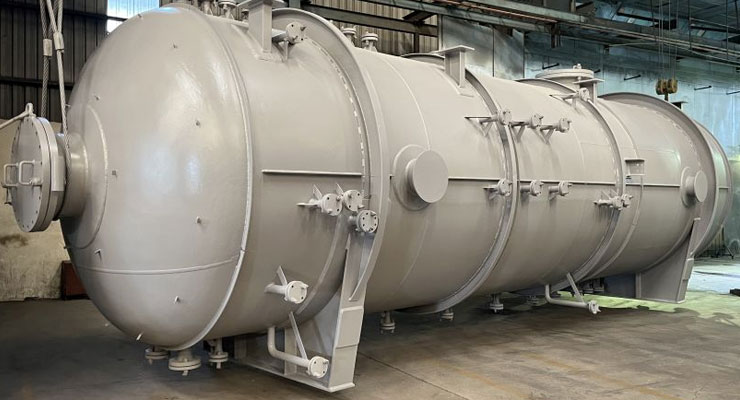Aspal Engineering is a leading Pressure Vessel Manufacturer in India, offering customized and certified vessels designed to store gases and liquids under high pressure. With a strong focus on safety, durability, and international standards, we serve industries such as oil & gas, petrochemical, power plants, pharmaceuticals, and chemical processing.

Used to store gases or liquids under pressure.
Common in industries like oil and gas, where they store natural gas, propane, and other hydrocarbons.
Transfer heat between two or more fluids at different temperatures.
Commonly used in power plants, chemical processing, and refrigeration.
Used in various chemical processes, including reactors, distillation columns, and separators.
Designed to withstand the conditions of specific chemical reactions or separations.
Produce steam by heating water under pressure.
Widely used in power generation, heating systems, and industrial processes.
High-pressure vessels used for sterilizing equipment and materials or for chemical reactions requiring high pressures and temperatures.
Common in medical and industrial applications.
Commonly used due to its strength and cost-effectiveness.
Suitable for a wide range of temperatures and pressures but requires protection against corrosion.
Provides excellent corrosion resistance and is used in applications involving aggressive chemicals or high temperatures.
More expensive than carbon steel.
Contain additional alloying elements to improve properties like strength, toughness, and resistance to high temperatures and corrosion.
Used in demanding applications, such as high-pressure steam systems.
Combine different materials to achieve a balance of strength, weight, and corrosion resistance.
Used in specialized applications, such as aerospace and underwater environments.
Determined by the maximum pressure the vessel is designed to withstand.
Must consider both internal and external pressures.
The design must account for the maximum and minimum operating temperatures.
Material selection and thickness depend on temperature conditions to prevent failure due to thermal stresses.
Extra material thickness is added to account for potential corrosion over the vessel's lifespan.
Design incorporates safety margins to ensure reliability under unexpected conditions or during prolonged use.
High-quality welding and seam construction are crucial to prevent leaks and ensure structural integrity.
Welding must comply with standards and undergo rigorous inspection.
A widely used standard in the United States and internationally.
Covers the design, construction, and inspection of pressure vessels.
Regulates the design, manufacture, and conformity assessment of pressure equipment in the European Union.
Provides guidelines for pressure vessels used in the oil and gas industry.
Offers international standards for pressure vessel design and construction.
Mandatory to detect signs of wear, corrosion, or damage.
Non-destructive testing (NDT) methods like ultrasonic testing, radiography, and magnetic particle inspection are commonly used.
Hydrostatic or pneumatic tests are performed to verify the vessel's integrity under pressure.
Critical for preventing overpressure conditions.
Must be regularly tested and maintained to ensure proper operation.
Methods such as coatings, cathodic protection, and material selection are employed to minimize corrosion.
We combine advanced fabrication technology, experienced engineering teams, and strict quality checks to deliver world-class pressure vessels. From heat exchangers to storage tanks, we are recognized as a reliable partner for industrial equipment.
Looking for a certified Pressure Vessel Manufacturer in India? Aspal Engineering offers custom solutions designed for safety, durability, and efficiency.
📞 Get in touch with us today for your pressure vessel requirements and request a free consultation.